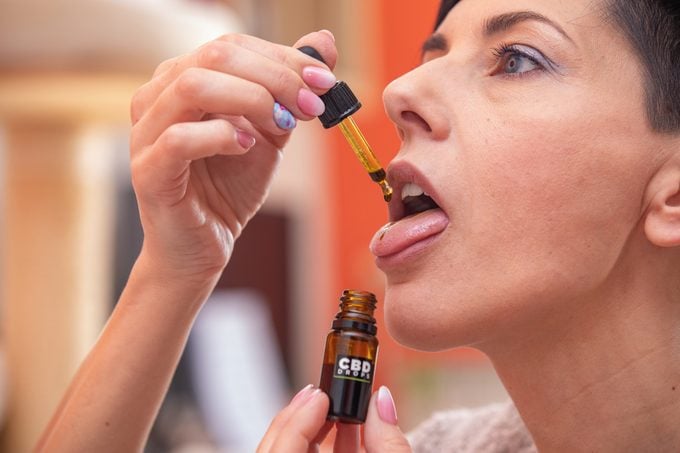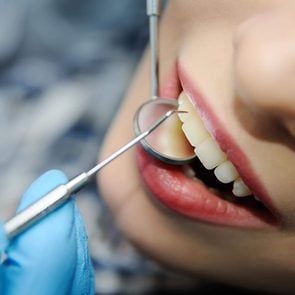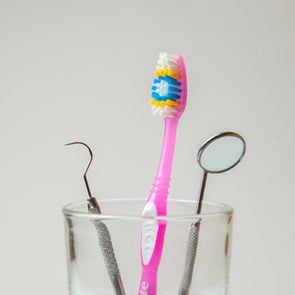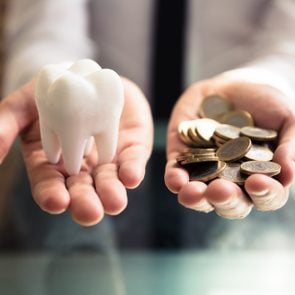CBD for Dental Pain, Anxiety, and Problems: Does It Work?
Updated: Mar. 14, 2022
CBD is touted for a lot of issues like sleep and anxiety. Can it help cavities, TMJ problems, gum disease, and sensitive teeth?
CBD oil is one of the hottest new ingredients in the healthy products arena. Companies are adding it to capsules, tinctures, oils, creams, patches, and even lip balms and shampoos, with proponents touting its benefits for anxiety, sleep, arthritis, nerve pain, and more.
One of the most common of hundreds of ingredients found in cannabis plants, cannabidiol (or CBD for short) does not cause the “high” that people associate with marijuana. And thanks to regulatory adjustments made by the FDA in 2015, researchers began conducting trials to determine CBD’s potential benefits on different areas of health and well-being, including dentistry.
Indeed, mouth pain can be difficult to manage if you’re unable to see a dentist right away or if you’re struggling to recover following surgery or a procedure. Here’s what you need to know about how CBD can play a role in dental care and oral health.

Dental anxiety
“At least 30 percent of people have some degree of anxiety about going to the dentist,” says Mark Burhenne, DDS, founder of AsktheDentist.com and the author of The 8-Hour Sleep Paradox. “If you’ve had one bad dental experience, especially as a child, that will give you a little PTSD.”
Dr. Burhenne explains that CBD acts on the part of the brain that processes fear, which can help ease patients’ nerves before a root canal or an extraction—and the research seems to to support the use of CBD for anxiety and PTSD.
In a study published in the Journal of Alternative and Complementary Medicine, psychiatric patients diagnosed with PTSD were given roughly 25mg of CBD in either a capsule or a spray and instructed to take it once or twice a day for eight weeks. They took it in addition to completing routine psychiatric care (most patients were undergoing therapy and taking medications for other mental health conditions). At the end of the trial, 91 percent of patients—10 out of a total of 11 patients—saw a reduction in symptom severity, with an average decrease of 28 percent. One caveat: Besides being a small study, the trial was open-label, meaning there was no placebo group. So, while promising, it’s hard to gauge the true efficacy of CBD without a control group.
A 2019 study from the University of Colorado found that 79 percent of patients (47 with anxiety and 25 with poor sleep) given CBD daily for one month experienced improvements in their anxiety. Again the study did not have a control group, so while promising, more study is needed. The verdict: Trials suggest that CBD may help relieve anxiety and PTSD, so if yours is tied to the dental chair, it may help you finally get that cavity filled.
Toothaches
“A true toothache is caused by inflammation of the pulp inside the tooth,” explains Dr. Burhenne. The effects of CBD on tooth pain specifically have not yet been studied, but the effects on inflammation and osteoarthritis have—which Dr. Burhenne says is similar. “With tooth pain the pulp swells, and because it’s in a space that doesn’t allow expansion, you get pain. It’s exactly the same in a joint,” he says. “It is an enclosed space, so there’s no room for the inflammation. But the anti-inflammatory properties of CBD can help with the pain.”
Indeed, a 2020 review published in Cannabis and Cannabinoid Research that looked at many of the existing studies on CBD and inflammation concluded that “the data overwhelmingly demonstrate that CBD is immune-suppressive and anti-inflammatory.”
Even so, to date the studies that have looked specifically at joint pain, the closest correlation to tooth pain, have been primarily conducted in animals or in laboratory containers. The verdict: The anti-inflammatory effects of CBD are supported by experts, and studies in test tubes and animals suggest it may have the ability to soothe a toothache. Don’t miss what experts need you to know about using CBD oil for pain before you try it.
Tooth sensitivity
Unlike a toothache, which originates inside the tooth, pain caused by tooth sensitivity comes from the outside, says Dr. Burhenne. “The roots of the tooth can become porous, and the nerve inside is sensitive. So if you bite into cold ice cream, for example, it can make the tooth hurt.”
This type of pain, which comes from the nerve and not from inflammation, is not known to be affected by CBD. The verdict: “CBD really has no place here,” says Dr. Burhenne. “The only way we know of to improve tooth sensitivity is calcifying the tooth with fluoride or hydroxyapatite.” (Here are 8 rules to follow if you have sensitive teeth.)
Gum disease
Formally known as periodontal disease, gum disease is an infection of the gums resulting from the build-up of plaque around the teeth fueled by the bacteria living in the mouth. Left unchecked, it can cause pain, swelling, and bleeding in the gums, painful chewing, and even tooth loss. What can CBD do to help? “CBD acts as a nutrient that feeds the oral microbiome,” explains Dr. Burhenne. “Somehow the presence of this oil makes all these bacterial populations work well together.
In one study in which dental plaque was collected from patients and treated with substances in laboratory dishes, CBD was better at reducing plaque colonies than several types of toothpaste. [The author is the founder of a medical-cannabis-for-dentistry company. However, she included a natural toothpaste her company sells in the study, and it was also outperformed by the CBD.]
The verdict: “The latest research on gum disease shows that it’s caused by an imbalance in the oral microbiome,” says Dr. Burhenne. “Products that combat this are coming, and CBD appears to be one of them.”
Cavities and tooth decay
“Every time you eat, the byproducts are digested by the bacteria in your mouth, which lowers the pH in your mouth,” explains Dr. Burhenne. “This causes something called demineralization of the teeth, which is how cavities are formed.”
Eating and drinking too frequently prevent the teeth from properly remineralizing, or rebuilding their structure after the previous meal, which can eventually lead to cavities and tooth decay. “The question, then, is whether CBD will have any effect on the demineralization/remineralization equilibrium,” says Dr. Burhenne. “And the answer is we really don’t know.”
The verdict: “There are products out there, mouthwashes and toothpastes, that have little bone particles in them to actively help the teeth remineralize,” says Dr. Burhenne. “CBD will never be able to do that because it’s not a building block for remineralization.”
TMJ/TMD
“TMJ, or TMD, which is the newer term, is a clicking or popping, stepping-on-rice-crispies kind of sound in the temporomandibular joint that can cause a lot of pain,” says Dr. Burhenne, of this disorder of the joint that connects your jawbone to your skull. “It becomes inflamed due to any number of things: A bad bite, trauma to the jaw, teeth grinding, sleep issues, poor orthodontics, poor facial development.”
CBD oil doesn’t fix the cause of TMD, the doctor says, although it may calm down the inflammation in the joint and help with the pain.
In a randomized, double-blind trial published in the Journal of Clinical Medicine, patients with TMD in the test group applied CBD ointment topically to the joints twice daily for 14 days, while patients in the control group used a placebo ointment. After two weeks, the CBD group reported a 70 percent reduction in pain, while the placebo group saw their pain decrease by just 10 percent.
The verdict: CBD may be an effective tool for combating the pain and discomfort caused by TMD. Here are the best CBD oils for pain if you’re looking to try it out.
Teeth grinding
“Dentistry has recently divided teeth grinding, or bruxism, into two separate problems: Daytime grinding and nighttime grinding,” says Dr. Burhenne. Daytime grinding is often the result of stress or anxiety, causes that CBD may help. But nighttime grinding, says Dr. Burhenne, is a different story.
“Nighttime grinding is usually more of a mechanical problem, like a collapsing airway or sleep apnea. CBD may help a patient sleep better so there may be less grinding, but it has no way of preventing or fixing a collapsed airway.”
The verdict: It depends on the source of your teeth grinding. If you’re grinding during the day as a result of anxiety, CBD may be able to help can you down. But if you’re grinding at night, it may be the result of a more serious problem that requires further treatment.
How much should you take, and how?
The limited number of trials that have been conducted on CBD oil make it difficult to say how much you should take. Most studies administer around 25mg of CBD at a time, and many of the products currently on the market suggest taking 15 to 30mg. But in his clinical experience, Dr. Burhenne has found that this dosage is too low to get results.
“I’ve experimented on sleep patients, anxious patients, and patients with TMD, and found that you need to start between 60 and 90mg for efficacy and go up from there,” he says. To get the best results, he also favors CBD in the form of drops under the tongue as opposed to gel capsules. “The mouth is very permeable, so I want it to absorb there and go right into the bloodstream as opposed to waiting for absorption to occur through the gut.”
Even so, the only way to determine your personal proper dosage is to try it. “First, get your MD to sign off on it and make sure you’re not on any meds that can be affected by CBD, like antihistamines, blood thinners, or PPIs [proton pump inhibitors],” says Dr. Burhenne. “Then once you have the OK, just start playing with it.”



